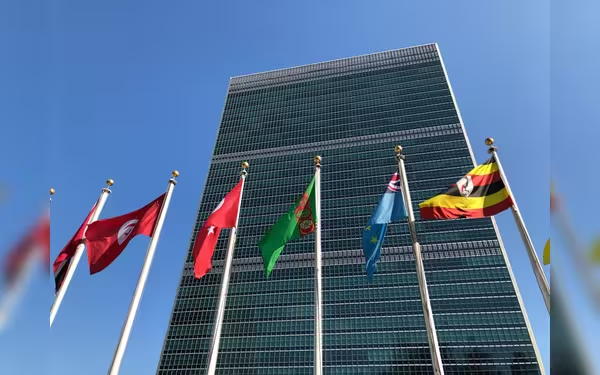Saturday, November 16, 2024 05:31 PM
UN Allocates $100 Million for Global Humanitarian Crises
- UN releases $100 million for humanitarian emergencies.
- Funding targets ten countries facing severe challenges.
- Humanitarian needs outpace available financial support.
 Image Credits: arabnewspk
Image Credits: arabnewspkThe UN has released $100 million to address humanitarian emergencies in ten countries, highlighting urgent needs amid funding shortfalls.
The United Nations has taken a significant step in addressing humanitarian crises around the globe by releasing $100 million for emergencies in ten countries. This funding aims to provide life-saving assistance to those in dire need, particularly in regions affected by conflict, displacement, and climate-related disasters.
Acting UN humanitarian chief Joyce Msuya highlighted the critical situation, stating that a lack of funding is hindering aid agencies from delivering essential support. She described the circumstances as "heart-wrenching," emphasizing the urgency of the situation. The funds will be allocated to countries facing severe challenges, including Yemen and Ethiopia, which are grappling with ongoing conflicts.
Yemen, enduring a civil war that has lasted nearly a decade, will receive $20 million, while Ethiopia, where government forces are engaged in battles with various rebel groups, will receive $15 million. Other countries benefiting from this funding include Myanmar, Mali, Burkina Faso, Haiti, Cameroon, and Mozambique, each receiving varying amounts to address their unique humanitarian needs.
Additionally, Burundi and Malawi will receive funds to combat severe food insecurity caused by an El Niño-induced drought and flooding. This release marks the second time this year that the Central Emergency Response Fund (CERF) has allocated $100 million for humanitarian emergencies, with the first round of funding distributed in February to countries like Chad, Congo, and Syria.
However, the UN Office for the Coordination of Humanitarian Affairs (OCHA) has expressed concern over the decreasing amount of funding available. The $200 million released this year is the lowest in the past three years, highlighting a growing gap between the urgent humanitarian needs and the financial support from donors. This year, the humanitarian community has appealed for a staggering $49 billion to assist 187 million people in crises worldwide, yet only 29 percent of that amount has been received, leaving a significant $35 billion shortfall.
In addition to the funding announcement, the UN and its partners have initiated emergency appeals to assist 14.5 million people in southern Africa affected by El Niño, specifically targeting countries like Zambia, Zimbabwe, Mozambique, and Malawi. This comprehensive approach underscores the UN's commitment to addressing the pressing humanitarian challenges faced by vulnerable populations.
As the world grapples with increasing humanitarian crises, it is crucial for nations and organizations to come together and support those in need. The release of these funds is a step in the right direction, but it is clear that more action is required to bridge the funding gap and ensure that aid reaches those who need it most. The plight of millions hangs in the balance, and it is our collective responsibility to respond with urgency and compassion.













